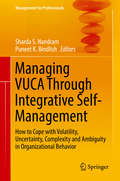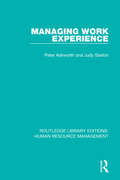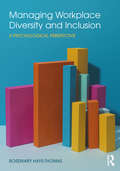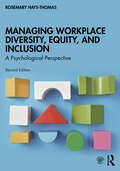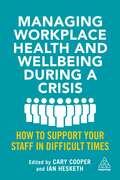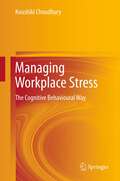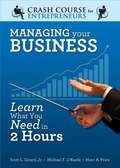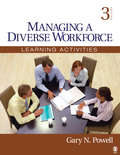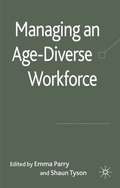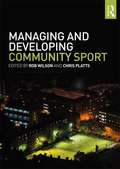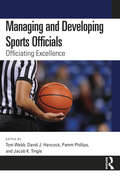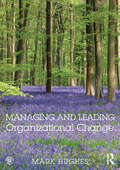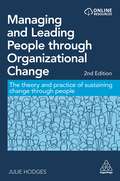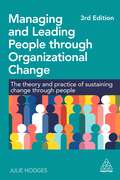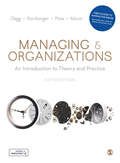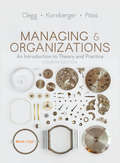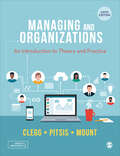- Table View
- List View
Managing VUCA Through Integrative Self-Management
by Sharda S. Nandram Puneet K. BindlishIn this book, experts discuss whether volatility, uncertainty, complexity and ambiguity (VUCA) represent a challenge or a business opportunity. More intense debates on global climate change, increased turbulence in financial quarters, increased job insecurity and high levels of stress at the workplace are attracting attention in the context of organization behavior and entrepreneurship. Fear and confusion have become part and parcel of business, often undermining trust, cooperation and inspiration. As a response, a new way of organizing self-management has emerged. The book combines practical wisdom from East and West, to develop integrative self-management theory and practice; provides direction to support an integrative mind-set, integrative organization and integrative leadership; and presents VUCA as an opportunity and necessity for development and growth, rather than a threat.
Managing Work Experience (Routledge Library Editions: Human Resource Management Ser.)
by Peter Ashworth Judy SaxtonThis book, first published in 1992, sets out the belief that the placement element of courses should be designed from the start as a genuine educational experience. The learner most not merely live through experiences which are supposed to lead to personal and professional development, but must reflect on experiences in a way which is planned to
Managing Workplace Bullying
by Aryanne OadeThis is a comprehensive, practical and engaging book designed to help readers to recognise bullying behaviour at work and identify and select inter-personal strategies for handling bullying behaviour.
Managing Workplace Diversity and Inclusion: A Psychological Perspective
by Rosemary Hays-ThomasManaging Workplace Diversity and Inclusion bridges the gap between social science theory and research and the practical concerns of those working in diversity and inclusion by presenting an applied psychological perspective. Using foundational ideas in the field of diversity and inclusion as well as concepts in the social sciences, this book provides a set of cognitive tools for dealing with situations related to workplace diversity and applies both classic theories and new ideas to topics such as United States employment law, teamwork, gender, race and ethnicity, sexual orientation, and other areas. Each chapter incudes engaging scenarios and real-world applications to stimulate learning and help students conceptualize and contextualize diversity in the workplace. Intended for upper-level undergraduates as well as graduate students, this textbook brings together foundational theories with practical, real-world applications to build a strong understanding of managing diversity and inclusion in the workplace.
Managing Workplace Diversity, Equity, and Inclusion: A Psychological Perspective
by Rosemary Hays-ThomasManaging Workplace Diversity, Equity, and Inclusion bridges the gap between social science theory and research and the practical concerns of those working in diversity, equity, and inclusion by presenting an applied psychological perspective. Using foundational ideas in the field of diversity, equity, and inclusion as well as concepts in the social sciences, this book provides a set of cognitive tools for dealing with situations related to workplace diversity and applies both classic theories and new ideas to topics such as United States employment law, teamwork, gender, race and ethnicity, sexual orientation, and other areas. Each chapter includes engaging scenarios and real-world applications to stimulate learning and help students conceptualize and contextualize diversity in the workplace. Intended for upper-level undergraduates as well as graduate students, this textbook brings together foundational theories with research-based and practical, real-world applications to build a strong understanding of managing diversity, equity, and inclusion in the workplace.
Managing Workplace Health and Wellbeing during a Crisis: How to Support your Staff in Difficult Times
by Cary Cooper and Ian HeskethDuring the Covid-19 pandemic, almost half of Americans reported that the crisis had a negative effect on their mental health. In the UK, the financial crisis of 2008 resulted in a rise in stress and anxiety and a decline in physical health. When dealing with a crisis, a business will consider the resilience of its structures and processes or the impact on forecasts and budgets but what about their people? Without a supported, engaged and motivated workforce, the business won't be able to achieve its crisis recovery plans. Managing Workplace Health and Wellbeing During a Crisis is a practical guide for all HR professionals and those responsible for talent management. It covers how to deal with employee stress and burnout as well as how to drive engagement, motivation and morale during unsettled times. There is expert guidance on how to deal with role and responsibility changes and explains how to improve productivity through effective employee communication. Supported by case studies from companies including Microsoft, Marks and Spencer, GlaxoSmithKline, Rolls-Royce and Twitter, this book equips readers to deal with a crisis as it is happening and implement longer term post-crisis strategies. Written by an expert author team including Professor Sir Cary Cooper, Chair of the National Board of Health and Wellbeing at Work, this is necessary reading for all professionals needing to deal with the health and wellbeing of their workforce in any crisis that may arise.
Managing Workplace Stress: The Cognitive Behavioural Way
by Koushiki ChoudhuryThis book is focussed at those who are working or are about to enter the workplace. According to the book, workplace may be defined as "any environment enabling work to be done". This broader definition will make the workplace include any situation or place where people interact to exchange knowledge and information. The book discusses the various anxiety and stress inducing events that one faces in the workplace and the ways to cope with them, using Rational Emotive Behaviour Therapy (REBT), and Cognitive Therapy (CT). These techniques are the most widely used psychotherapeutic techniques and their effectiveness has been tested scientifically throughout the world. The book attempts to show as to how Cognitive Behaviour Therapy (umbrella term for CT and REBT) can be used to challenge and overcome workplace stress issues such as criticism, abuse, animosity, conflicts, disagreements, insubordination, organisational politics, favouritism, prejudices, discriminations, job uncertainties, extreme work pressures, excessive workloads, poor job designs, job mismatches, role conflicts, role ambiguities, cultural and ethical maladjustments, workplace boredom and anger problems by realistically and accurately interpreting events at the workplace. It includes plenty of real-life stress producing scenarios as examples and specific techniques to challenge them. Moreover, it tries to analyze and solve workplace stress issues in a very lucid, simple and direct manner so that it appeals to and is understood by a wide range of people. The book is based on research and studies in the area of internal marketing, psychological counselling and workplace stress, and is the product of years of surveys and professional interactions in the industry and the academia.
Managing Your Academic Research Project
by Jacqui Ewart Kate AmesThis book is an essential resource for academics managing a large and complex research project. It provides important practical insights into the processes that inform such research projects and delivers insights into the delicate balance between industry, stakeholder and academic needs. It gives practical advice about developing relationships with diverse partners and colleagues and managing the expectations of the various parties involved and on avoiding pitfalls. This book uses examples from Australian research projects, but it contains insights relevant to researchers all around the world.
Managing Your Boss
by John P. Kotter John J. GabarroManaging your boss: Isn't that merely manipulation? Corporate cozying up? Not according to John Gabarro and John Kotter. In this handy guidebook, the authors contend that you manage your boss for a very good reason: to do your best on the job--and thereby benefit not only yourself but also your supervisor and your entire company. Your boss depends on you for cooperation, reliability, and honesty. And you depend on him or her for links to the rest of the organization, for setting priorities, and for obtaining critical resources. By managing your boss--clarifying your own and your supervisor's strengths, weaknesses, goals, work styles, and needs--you cultivate a relationship based on mutual respect and understanding. The result? A healthy, productive bond that enables you both to excel. Gabarro and Kotter provide valuable guidelines for building this essential relationship--including strategies for determining how your boss prefers to process information and make decisions, tips for communicating mutual expectations, and tactics for negotiating priorities. Thought provoking and practical, Managing Your Boss enables you to lay the groundwork for one of the most crucial working relationships you'll have in your career.
Managing Your Business
by Scott L. Girard Jr. Michael F. O'Keefe Marc A. PriceThe third in a 12-title series, A Crash Course for Entrepreneurs, that coaches prospective and new entrepreneurs in managing employees. Many novice entrepreneurs have little more than a brilliant idea and a pocketful of ambition. They may not be born managers. So they want to know "Now what?" This book tells you exactly what you must know, in simple terms, using real-world examples. In a two-hour read, it walks you through the essentials of leading and managing, and gives seasoned advice in a reader-friendly way. Learn what types of leadership there are and when to use your options effectively, how to avoid looking like a beginner, how to make meetings really work, how to manage diversity for rich results, when to coach and when to terminate, what's okay and what's not in the office, how to make your office culture work, how to work really efficiently so you can manage and lead at your best, when to outsource, and how to cut costs and spend wisely. Find out what other critical resources, processes and practices will help ensure your success. Whether your dream business is dog walking or high-tech invention, home-based or web-based, these serial entrepreneurs will save you time and trouble as you manage the people in your new company. About the authors: Collectively, these three young Florida-based serial entrepreneurs have successfully started ten new companies across a broad range of sectors and frameworks, including finance, international sourcing, medical products, innovative dot-com initiatives, and traditional brick-and-mortar companies. Their Internet-based interactive business resource, Expert Business Advice.com, provides an extensive range of tools for entrepreneurs, both aspiring and experienced. Planning templates, articles with fresh new insights, one-on-one advice, references, and syndicated news are just some of the offerings.
Managing a Diverse Workforce: Learning Activities
by Gary N. PowellExperiential activities help students understand workplace diversityThis book shows readers how to create an inclusive work environment and culture that can value and leverage the contributions of all members, regardless of personal characteristics that are not pertinent to the job. To achieve this, the book provides a comprehensive set of learning activities that address issues related to workplace diversity. Drawing on a variety of work settings, including both business and not-for-profit organizations, Managing a Diverse Workforce, Third Edition will be an invaluable asset for human resource development courses in departments of management, public administration, and human services. It is a perfect companion to core texts on workforce diversity, including Gary Powell′s Women and Men in Management, Fourth Edition (SAGE).
Managing an Age Diverse Workforce
by Emma Parry Shaun Tyson.Unique in the multiple approaches that it encompasses, this book includes discussions of both older and younger workers, employer and employee perspectives, generational and age diversity and international comparisons. It includes both conceptual argument and empirical research in order to provide insights into this important area.
Managing and Developing Community Sport
by Rob Wilson Chris PlattsCan sport and physical activity (PA) be used to improve the communities we live in? How do community groups manage facilities that provide sport and PA? How can managers ensure the services they deliver meet the needs of their community? What role should community sport schemes play in society? Answer these questions and more in this, the first textbook to focus on the theory and practice of community-level sport management and development. Bringing together academics and practitioners with expertise in sport management, sport development, the sociology of sport, PA programming and community coaching, this book outlines best practice and explores contemporary issues relating to: Community enhancement through sport and PA Leadership, enterprise and innovation Budgeting and decision making Event and facility management Corporate social responsibility (CSR) Monitoring and evaluation. The book is divided into three sections: Part I provides an introduction to developing and managing community sport; Part II outlines the key issues and challenges that face those working in the sector; and Part III examines the leadership and management qualities needed to effectively manage and develop community sport. Insightful and user-friendly, Managing and Developing Community Sport is written in an easy to read style and is a vital resource for sport management practitioners or students hoping to work in community-level sport.
Managing and Developing Sports Officials: Officiating Excellence
by Pamm Phillips Tom Webb Jacob K. Tingle David J. HancockThis book offers an evidence-based guide to the development, management, and retention of sports officials. Drawing on research at all levels of sport, from grassroots to professional, this book focuses on best practices for sports officials and for anybody involved in the management or training of sports officials.This book is divided into three parts. The first takes a close look at who sports officials are, their motivations, and the formal and informal organizational relationships that define an official’s position in sport. The second examines the factors that can keep an official engaged in their sport, from building healthy cultures and good physical preparation to mentoring and mental health. The final part looks at the development of officials to elite level, including effective communication, improving decision-making, interpreting rules and laws, and career pathways. With case studies, real-life examples, and the voices of practicing officials included throughout this book, it introduces core concepts and best practices applicable across sports and different national and international contexts.This is an essential reference for all sports officials and for practitioners and policymakers working in sports organizations at all levels.
Managing and Leading Organizational Change
by Mark HughesOrganizational change impacts upon all organizations regardless of size and sector. In this unique organizational change textbook, important ongoing debates about managing change and leading change are combined, giving a broader perspective that encourages readers to engage with both management and leadership. In combination, management and leadership insights inform how organizations are changing and how we can make a positive difference in such processes of change. Managing and Leading Organizational Change speaks both to the applied and practical aspects of organizational change, as well as questioning the research and evidence base of organizational change practices. Chapters begin with real-world insights, followed by coverage of the major theories. The ongoing nature of these debates is signposted through the inclusion of questioning sections with research case studies showcased. This textbook will be particularly beneficial for final year undergraduates and postgraduates studying organizational change, strategic change, change management and change leadership modules.
Managing and Leading People Through Organizational Change
by Dr Julie HodgesTremendous forces for change are radically reshaping the world of work. Disruptive innovations, radical thinking, new business models and resource scarcity are impacting every sector. Although the scale of expected change is not unprecedented, what is unique is the pervasive nature of the change and its accelerating pace which people in organizations have to cope with. Structures, systems, processes and strategies are relatively simple to understand and even fix. People, however, are more complex. Change can have a different impact on each of them, all of which can cause different attitudes and reactions. Managing and Leading People Through Organizational Change is written for leaders with the key responsibility of managing people through transitions. Managing and Leading People through Organizational Change provides a critical analysis of change and transformation in organizations from a theoretical and practical perspective. It addresses the individual, team and organizational issues of leading and managing people before, during and after change, using case studies and interviews with people from organizations in different sectors across the globe. This book demonstrates how theory can be applied in practice through practical examples and recommendations, focusing on the importance of understanding the impact of the nature of change on individuals and engaging them collaboratively throughout the transformation journey.
Managing and Leading People through Organizational Change: The Theory and Practice of Sustaining Change through People
by Dr Julie HodgesChange in organizations is all about people: it is people who plan, prepare for and implement change, and who are affected by it in the daily course of their work. Yet there is a tendency to focus on quantifiable and often more easily solved technical aspects of implementing organizational change programmes, and ignore the complex ways that these will impact individuals. Providing an evidence-based analysis of change in organizations, Managing and Leading People Through Organizational Change is written for practitioners responsible for change programmes and postgraduate students of organizational change. This updated edition demonstrates the importance of understanding the effects of change on individuals and engaging them collaboratively through the transformation journey. Featuring new material on individual wellbeing and the impact of technological advances on the workplace, this book sets out frameworks, practical approaches and recommendations for communicating with and leading individuals, teams and organizations through change. Full of exercises, interviews and case studies from across the globe, this book is an essential resource for leaders and students enabling them to achieve sustainable benefits of change at work.
Managing and Leading People through Organizational Change: The Theory and Practice of Sustaining Change through People
by Professor Julie HodgesChange in organizations is all about people; it is people who plan, prepare for and implement change and who are affected by it in the daily course of their work. However, there is a tendency to focus on the more technical and quantifiable aspects of implementing organizational change programmes whilst ignoring the complex ways that these will impact individuals. Providing an evidence-based analysis of change in organizations, Managing and Leading People Through Organizational Change is written for senior practitioners responsible for change programmes and postgraduate students of organizational change. This updated edition demonstrates the importance of understanding the impact of developing technologies, including AI, as well as how best to implement sustainability and inclusion in the workplace. With new material on individual wellbeing and the impact of hybrid working, this book sets out frameworks, practical approaches and recommendations for communicating with and leading individuals, teams and organizations through change. Full of exercises, interviews and real-world examples from across the globe, this book is an essential resource for leaders and students enabling them to achieve sustainable benefits of change at work.
Managing and Organizations: An Introduction to Theory and Practice
by Martin Kornberger Stewart R Clegg Tyrone S. Pitsis Dr Matthew MountA realist's guide to management, the authors capture the complex life of organizations, providing not only an account of theories, but also an introduction to their practice with examples from everyday life and culture discussing the key themes and debates along the way. Used by nearly 50,000 students and tutors worldwide, Managing and Organizations has been praised for its breadth, innovative content and application to real life. Along with its full coverage of all the essential topics of organizational behavior, the book offers a critical perspective that gives the reader the tools to question dominant assumptions about organizations. New to this edition: A new chapter structure to create a clearer, elegant chapter navigation for students. Chapters have now been streamlined and pulled back to no more than 15,000 words each New and up to date global cases and examples to engage students (Including Netflix, the Crown, Trump and North Korea). Updated and fully integrated IEB – offers a dynamic learning experience for students. Definitions in margins to support B&M learners who do not have English as a first language Updated online resources and new author videos. The book is supported by online resources for both instructors and students, including chapter-specific PowerPoint slides, an instructor manual, test bank, additional case studies articles for lecturers, MCQ’s, SAGE journal articles, flashcards and relevant web links. Students get a free interactive eBook with every purchase of the print copy. For students studying Organisational Behaviour, Managing People in Organisations and Introductory Management courses.
Managing and Organizations: An Introduction to Theory and Practice
by Martin Kornberger Stewart R Clegg Tyrone S. Pitsis Dr. Matthew MountA realist's guide to management, the authors capture the complex life of organizations, providing not only an account of theories, but also an introduction to their practice with examples from everyday life and culture discussing the key themes and debates along the way. Used by nearly 50,000 students and tutors worldwide, Managing and Organizations has been praised for its breadth, innovative content and application to real life. Along with its full coverage of all the essential topics of organizational behavior, the book offers a critical perspective that gives the reader the tools to question dominant assumptions about organizations. New to this edition: A new chapter structure to create a clearer, elegant chapter navigation for students. Chapters have now been streamlined and pulled back to no more than 15,000 words each New and up to date global cases and examples to engage students (Including Netflix, the Crown, Trump and North Korea). Updated and fully integrated IEB – offers a dynamic learning experience for students. Definitions in margins to support B&M learners who do not have English as a first language Updated online resources and new author videos. The book is supported by online resources for both instructors and students, including chapter-specific PowerPoint slides, an instructor manual, test bank, additional case studies articles for lecturers, MCQ’s, SAGE journal articles, flashcards and relevant web links. Students get a free interactive eBook with every purchase of the print copy. For students studying Organisational Behaviour, Managing People in Organisations and Introductory Management courses.
Managing and Organizations: An Introduction to Theory and Practice
by Martin Kornberger Stewart R Clegg Tyrone S. PitsisGet 12 months FREE access to an interactive eBook* when you buy the paperback (Print paperback version only 9781446298374) 'Already a classic in its field, Managing and Organizations’ success among teachers and students reflects its comprehensiveness and accuracy. A great handbook from which to teach management’ - Dr Jose Bento da Silva, University of Warwick A realist's guide to management, the authors capture the complex life of organizations, providing not only an account of theories, but also an introduction to their practice with examples from everyday life and culture discussing the key themes and debates along the way. Intended as a 'travel guide' to the world of management, the content contains reliable maps of the terrain, critical viewpoints, with ways forward outlined, and an exploration of the nooks, crannies and byways whilst still observing the main thoroughfares. This is a resource that will help navigate this world, encouraging the reader to explore not only the new, exciting and brilliant aspects, but also some dark sides as well. The new edition includes: A new chapter on "Organizational Conflict" Revised case studies examining key organizational issues and exploring diverse scenarios. Even more examples and cases throughout covering the most current examples from the business world – e.g. Airbnb, Uber, Spotify. A free interactive eBook* featuring author videos, web-links to news articles and Ted Talks, multiple choice questions, flashcards, SAGE journal articles and other relevant links, allowing access on the go and encouraging learning and retention whatever the reading or learning style. Suitable for students studying Organisational Behaviour, Managing People in Organisations and Introductory Management courses taking an Organisational Behaviour slant. (*interactivity only available through Vitalsource eBook)
Managing and Organizations: An Introduction to Theory and Practice
by Martin Kornberger Stewart R Clegg Tyrone S. PitsisGet 12 months FREE access to an interactive eBook* when you buy the paperback (Print paperback version only) For the last ten years, more and more students have been won over by Managing and Organizations' unparalleled coverage, wisdom and insight into the bustling and complex life of organizations. Now in its Fourth Edition, this unique and highly esteemed text goes from strength to strength, offering: seamless coverage of the essential topics of organizational behaviour a realist's guide to management capturing the complex life of organizations (the paradoxical, emotional, insecure, self-confident, responsible, irresponsible) and delivering the key themes and debates in an accessible way interactive, instructive (and fun) learning aids and features, both in the text and on the companion website an attractive, easily navigable, full-colour text design As well as cutting-edge content and features, new to the fourth edition: chapter on Organizational Conflict a fully revised range of learning aids and features providing interactive and instructive guidance to encourage critical thinking and the application of real-life experience revised case studies at the end of every chapter that examine key organizational issues in-depth from a diverse range of scenarios a fully revised companion website with comprehensive resources, including 'What Would You Do?' author videos free access to an interactive e-book with paperback purchases which includes links to additional video, audio and print content, for a more dynamic learning experience, allowing students to read and study, how when and where they want (*interactivity only available through Vitalsource eBook)
Managing and Organizations: An Introduction to Theory and Practice
by Stewart R Clegg Tyrone S. Pitsis Matthew MountCovering all the basics in organizational behaviour, as well critically reflecting on the institutions and practices of business life, the sixth edition of Managing and Organizations: An Introduction to Theory and Practice has been updated to include: · Cutting-edge content on diversity and inclusion, design thinking, followership and deglobalization · New and updated ′In Practice′ boxes offering real-world examples · Engaging case studies, such as How to start decolonising your business, Power and empathy and How COVID-19 has changed university teaching · New ‘Additional Resources’ in each chapter This textbook is essential reading for anyone studying organizational behaviour at undergraduate or postgraduate level. A wealth of online resources for both students and lecturers, including a fully revised Instructor’s Manual, PowerPoint slides and additional case studies, are available via the companion website. Stewart Clegg is Professor at the University of Stavanger, Norway; University of Sydney and Emeritus Professor at University of Technology Sydney, Australia Tyrone S. Pitsis is Professor of Strategy, Technology & Society at Durham University Business School. Matt Mount is Assistant Professor of Strategy and Innovation at Deakin Business School, Melbourne.
Managing and Organizations: An Introduction to Theory and Practice
by Stewart R Clegg Tyrone S. Pitsis Matthew MountCovering all the basics in organizational behaviour, as well critically reflecting on the institutions and practices of business life, the sixth edition of Managing and Organizations: An Introduction to Theory and Practice has been updated to include: · Cutting-edge content on diversity and inclusion, design thinking, followership and deglobalization · New and updated ′In Practice′ boxes offering real-world examples · Engaging case studies, such as How to start decolonising your business, Power and empathy and How COVID-19 has changed university teaching · New ‘Additional Resources’ in each chapter This textbook is essential reading for anyone studying organizational behaviour at undergraduate or postgraduate level. A wealth of online resources for both students and lecturers, including a fully revised Instructor’s Manual, PowerPoint slides and additional case studies, are available via the companion website. Stewart Clegg is Professor at the University of Stavanger, Norway; University of Sydney and Emeritus Professor at University of Technology Sydney, Australia Tyrone S. Pitsis is Professor of Strategy, Technology & Society at Durham University Business School. Matt Mount is Assistant Professor of Strategy and Innovation at Deakin Business School, Melbourne.
